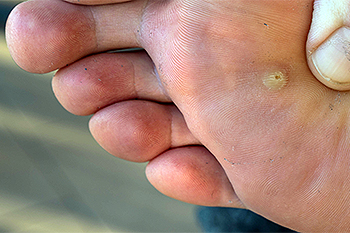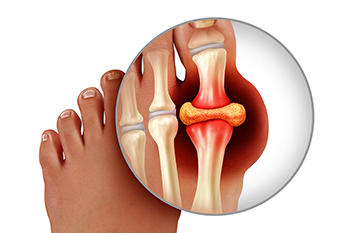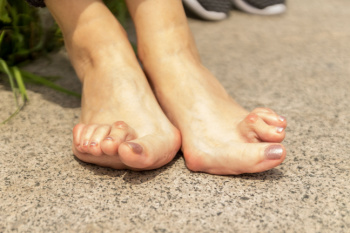Connect With Us
Blog

Plantar warts are non-cancerous growths that develop on the soles of the feet, caused by a viral infection from the human papillomavirus, or HPV. The virus enters the skin through small cuts or abrasions and results in the formation of hard, rough patches. There are two main types of plantar warts, solitary and mosaic. Solitary warts appear as single, raised lesions that can cause pain when walking or standing, while mosaic warts are clusters of smaller warts grouped together. Symptoms include pain, discomfort, and the appearance of a thickened, calloused area on the skin. The warts may also have tiny black dots, which are small blood vessels that have clotted. Plantar warts are contagious and can be spread through direct contact or shared surfaces, such as public pool areas. They can be painful and it may be difficult to complete daily activities. If you have developed this foot condition, it is suggested that you promptly contact a podiatrist who can offer effective treatment options.
Plantar warts can be very uncomfortable. If you need your feet checked, contact Stephanie Oexeman, DPM from Oexeman Foot and Ankle, PLLC. our doctor will assist you with all of your foot and ankle needs.
About Plantar Warts
Plantar warts are the result of HPV, or human papillomavirus, getting into open wounds on the feet. They are mostly found on the heels or balls of the feet.
While plantar warts are generally harmless, those experiencing excessive pain or those suffering from diabetes or a compromised immune system require immediate medical care. Plantar warts are easily diagnosed, usually through scraping off a bit of rough skin or by getting a biopsy.
Symptoms
- Lesions on the bottom of your feet, usually rough and grainy
- Hard or thick callused spots
- Wart seeds, which are small clotted blood vessels that look like little black spots
- Pain, discomfort, or tenderness of your feet when walking or standing
Treatment
- Freezing
- Electric tool removal
- Laser Treatment
- Topical Creams (prescription only)
- Over-the-counter medications
To help prevent developing plantar warts, avoid walking barefoot over abrasive surfaces that can cause cuts or wounds for HPV to get into. Avoiding direct contact with other warts, as well as not picking or rubbing existing warts, can help prevent the further spread of plantar warts. However, if you think you have developed plantar warts, speak to your podiatrist. He or she can diagnose the warts on your feet and recommend the appropriate treatment options.
If you have any questions please feel free to contact our office located in Chicago, IL . We offer the newest diagnostic and treatment technologies for all your foot and ankle needs.

Gout is a form of inflammatory arthritis that often affects the joints of the toes, particularly the big toe. This happens when excess uric acid in the blood forms sharp crystals that deposit in the joints, leading to sudden and intense pain, swelling, and redness. Several factors contribute to high levels of uric acid. Dietary triggers such as red meat, seafood, and alcohol can increase uric acid production. Genetic factors also play a role, making some individuals more prone to developing gout. Certain medical conditions, including kidney disease, high blood pressure, and diabetes, can interfere with uric acid removal. A sedentary lifestyle or obesity further increase the risk. The toes are especially vulnerable due to their cooler temperature, which encourages crystal formation in that area. If you have symptoms of gout, it is suggested that you promptly contact a podiatrist who can help you to manage this painful condition.
Gout is a foot condition that requires certain treatment and care. If you are seeking treatment, contact Stephanie Oexeman, DPM from Oexeman Foot and Ankle, PLLC. our doctor will treat your foot and ankle needs.
What Is Gout?
Gout is a type of arthritis caused by a buildup of uric acid in the bloodstream. It often develops in the foot, especially the big toe area, although it can manifest in other parts of the body as well. Gout can make walking and standing very painful and is especially common in diabetics and the obese.
People typically get gout because of a poor diet. Genetic predisposition is also a factor. The children of parents who have had gout frequently have a chance of developing it themselves.
Gout can easily be identified by redness and inflammation of the big toe and the surrounding areas of the foot. Other symptoms include extreme fatigue, joint pain, and running high fevers. Sometimes corticosteroid drugs can be prescribed to treat gout, but the best way to combat this disease is to get more exercise and eat a better diet.
If you have any questions please feel free to contact our office located in Chicago, IL . We offer the newest diagnostic and treatment technologies for all your foot and ankle needs.

Rheumatoid arthritis, or RA, is an autoimmune condition that causes inflammation in the joints, often beginning in the smaller joints such as those in the feet. In its early stages, rheumatoid arthritis may cause subtle symptoms that gradually worsen over time. Individuals might notice stiffness in the feet, particularly in the morning or after long periods of rest. Swelling surrounding the toe joints or the ball of the foot may also develop, accompanied by warmth and tenderness. Pain can be constant or may come and go, making walking uncomfortable. As the condition progresses, joint function can be affected, leading to changes in foot shape. If you have joint pain and stiffness in your feet, it is suggested that you are under the care of a podiatrist who can offer appropriate relief and treatment remedies.
Because RA affects more than just your joints, including the joints in your feet and ankles, it is important to seek early diagnosis from your podiatrist if you feel like the pain in your feet might be caused by RA. For more information, contact Stephanie Oexeman, DPM of Oexeman Foot and Ankle, PLLC. our doctor will assist you with all of your podiatric concerns.
What Is Rheumatoid Arthritis?
Rheumatoid Arthritis (RA) is an autoimmune disorder in which the body’s own immune system attacks the membranes surrounding the joints. Inflammation of the lining and eventually the destruction of the joint’s cartilage and bone occur, causing severe pain and immobility.
Rheumatoid Arthritis of the Feet
Although RA usually attacks multiple bones and joints throughout the entire body, almost 90 percent of cases result in pain in the foot or ankle area.
Symptoms
- Swelling and pain in the feet
- Stiffness in the feet
- Pain on the ball or sole of feet
- Joint shift and deformation
Diagnosis
Quick diagnosis of RA in the feet is important so that the podiatrist can treat the area effectively. Your doctor will ask you about your medical history, occupation, and lifestyle to determine the origin of the condition. Rheumatoid Factor tests help to determine if someone is affected by the disease.
If you have any questions please feel free to contact our office located in Chicago, IL . We offer the newest diagnostic and treatment technologies for all your foot and ankle needs.

